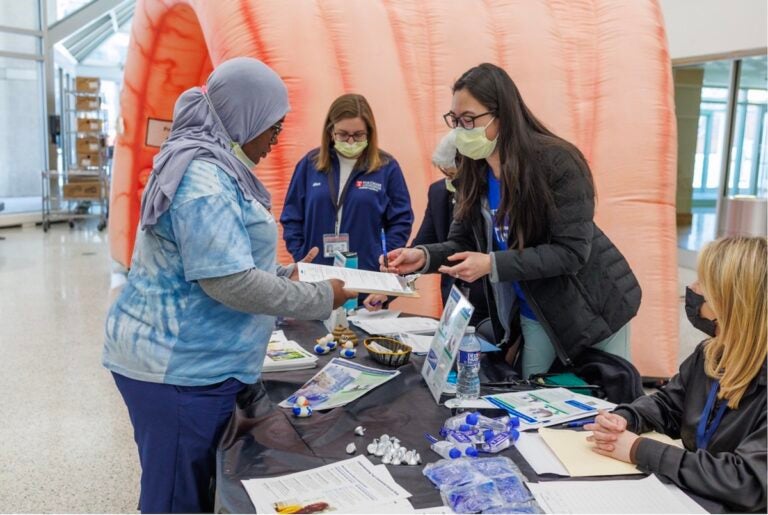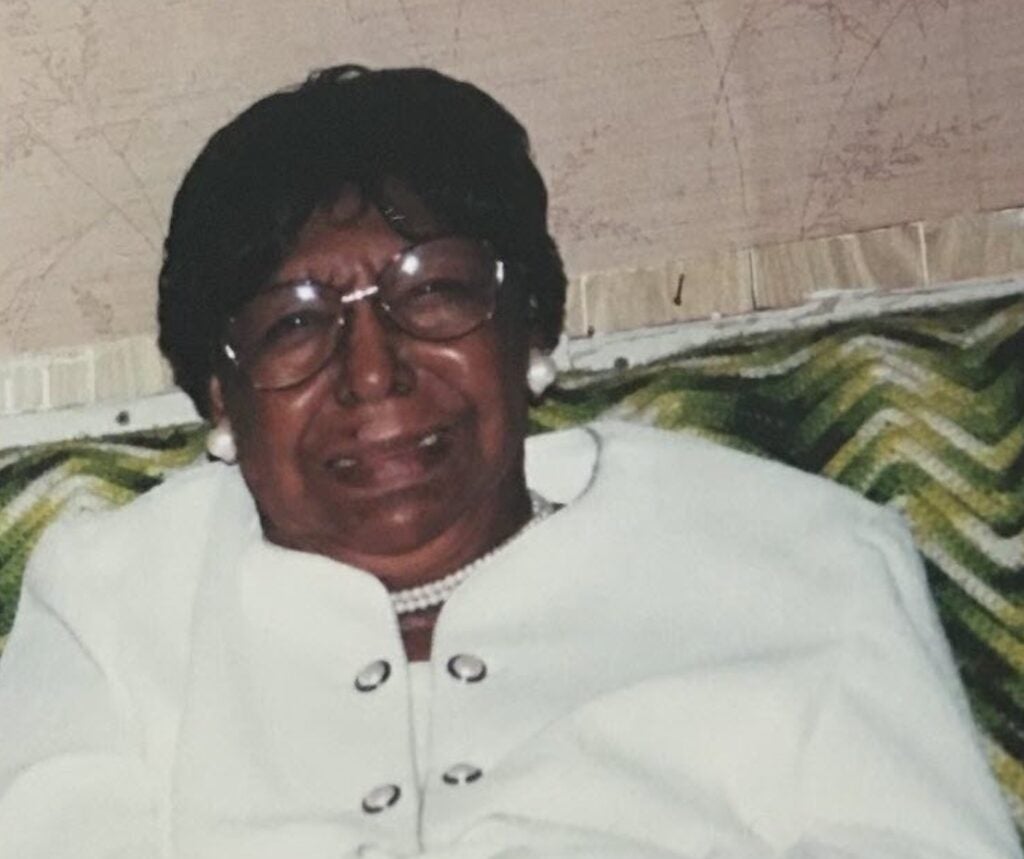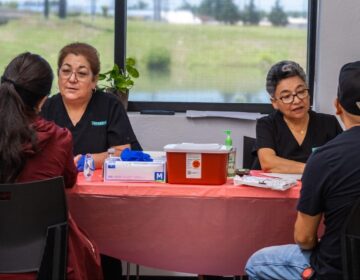Philadelphia hospital turns to simpler screening for colon cancer to increase access
To get more people screened for colorectal cancer, Philadelphia doctors at Temple University turn to stool-based take home tests.
Listen 7:49
Temple Health physicians and providers hand out FIT take home kits for stool-based colorectal cancer screenings. (Courtesy of Temple Health)
This story is from The Pulse, a weekly health and science podcast.
Find it on Apple Podcasts, Spotify, or wherever you get your podcasts.
There were signs, for years, that something was wrong with her grandmother’s health, Kimberly McNeil said.
“She would walk around and she had a stomach that protruded, almost as if she was pregnant, but nobody knew why,” she said.
McNeil recalled that her grandmother, Sammie Lee Brewer, didn’t eat very much.
“Her food just wasn’t digesting well, but she didn’t explain that to anyone and she didn’t really ask any questions,” she said. “And because she didn’t complain, we didn’t ask questions either.”
It’s only in retrospect that McNeil can recognize the symptoms for what they were: colorectal cancer.
When Brewer was diagnosed, she was in her 80s and had never had a colonoscopy.
“She was already in stage 4, so it had been going on for quite some time and she just didn’t realize that that’s what she had,” said McNeil.
In fact, it was rare for her grandmother to visit any kind of health care provider. She was too busy raising a family and working long hours as a live-in housemaid in Philadelphia.
“She never really made time for her health, and even when she retired, I think because she just didn’t really feel sick, she was one of those people that didn’t go to the doctors if she didn’t feel well,” McNeil said. “So, she just kind of grinned and bared it and just kind of pushed through.”

Subscribe to The Pulse
But even for people who go to the doctor’s office more regularly, a colonoscopy can be a commitment. It’s an invasive, multi-step procedure, it means time off from work, and usually requires transportation home.
An estimated 106,970 people in the United States will be diagnosed with colon cancer this year.
The disease is very treatable and curable, when caught early. But not everyone gets screened starting at the Centers for Disease Control and Prevention’s recommended age of 45 years old.
Colonoscopy is the gold standard test to detect early signs of cancer, but since it can be out of reach for many people, doctors in Philadelphia are focusing their efforts on expanding access to faster, simpler, stool-based screening.
“It’s this idea that you don’t have to fit in the lines,” said Dr. Claire Raab, internist at Temple Health. “You don’t have to have an established primary care provider to have access to this, and that’s I think the single greatest thing that will lower the access bar for the population.”
Barriers to a multi-step procedure, and fear
Physicians at Temple Health see barriers with colonoscopies come into play in their practice. For example, the prep that requires drinking a liquid solution to clear out the bowel, which usually causes multiple trips back and forth to the bathroom over several hours.
“I had a patient who didn’t have a bathroom, you know what I mean?” said Dr. Jessica Briscoe, a Temple gastroenterologist. “We had to try to work with our social workers to see if we could get her a safe place where she could prep.”
And then there’s general fear of the procedure itself. McNeil said this can be especially true among people who’ve suffered harm and racial discrimination when seeking health care services.
Colorectal cancer disproportionately affects Black people in the United States. They are about 20 percent more likely to get the disease, and 40 percent more likely to die from it than most other racial groups, according to national data.
Screening rates among Black and Hispanic people have gone up over time, but estimates from the National Cancer Institute show that they still fall short when compared to white people.
“And then there is a subset of patients who are nervous to just even know the answer,” Raab said. “We see a lot in our underserved populations, really around preventative care, a lot of anxiety to work through.”
Raab said she and her colleagues at Temple Health in Philadelphia started to think about ways to make screening more accessible. They turned to a simpler, quicker method: stool-based take-home tests.
Alternative screening and testing at home
In the check-in area at the Temple Digestive Disease Center, people sat in rows of chairs as they waited for their names to be called. Some of them were there for colonoscopy screenings.
In one of the surgical rooms, a hospital bed is set up in the center of the space. A big monitor hangs down from the ceiling. This is where gastroenterologists like Briscoe looks at video of a patient’s internal organs when she guides a scope through their colon.
But by the time some of her patients make it here, they’re already showing signs of advanced disease.
This is where fecal immunochemical tests – FIT for short – can help make a difference, she said.
“This program is used to touch the entire community, and I think that that’s what it’s going to do,” Briscoe said. “FIT testing, colonoscopy – the best screening test is the one that gets done and that’s what we’re trying to do.”
These are easy-to-use test kits that people can take home and perform themselves, on their own time. Patients collect a tiny sample of their own stool and then mail it off to a laboratory for testing. Some FIT kits even provide rapid response, immediate results at home.
It’s an alternative screening option for patients with a low risk of colon cancer, said Temple internal medicine chief resident Dr. Rishabh Khatri, meaning they don’t have a family history of the disease or active symptoms.
Nothing can replace the accuracy of colonoscopies, which are recommended for healthy people every 10 years through age 75, but research shows that stool-based screenings are effective in detecting signs of cancer, even at early stages.
Guidelines recommend that people complete a screening kit once every year or every three years, depending on the type of stool-based test.
“It really eliminates all the steps of having to come in, taking a day off of work, drinking the prep that can be cumbersome,” Khatri said. “It really puts everyone, every patient, on a fast track to prevention.”
The take-home stool-based test kits each cost about $24 dollars commercially after insurance and discounts. Raab said that makes it a cost-effective option for health systems to buy and distribute on a large scale.
The project at Temple Health has distributed between 500 and 600 free kits so far.
“There is no real rule that says we can’t hand out FIT tests in the lobby and we can’t hand out FIT tests in our subspecialty clinics” she said, “and there’s really no reason we can’t hand it out to our inpatients.”
To ensure that people complete the tests, Temple health navigators follow up with patients by phone, multiple times if necessary. They ask if tests have been completed, answer any questions, and confirm and record the results.
When someone gets a positive stool reading, they get scheduled for a traditional colonoscopy as soon as possible so that they don’t get stuck in a backlog of screening appointments, a problem that predated COVID-19 and was exacerbated by a pause on elective procedures during the pandemic.
“So, if our average colonoscopy [wait] time is a few months now, we have been able to get all of those patients either to Dr. Briscoe right away or to colonoscopy within two weeks,” Raab said. “They’re really triaged. They get to the top of the list because they’re sicker.”
Reducing racial disparities and boosting screening rates
Kimberly McNeil wondered if things would have turned out differently for her grandmother if she had access to a stool-based test kit or if she got a colonoscopy earlier in life.
When Sammy Lee Brewer received her late-stage diagnosis, and considered a long road of surgery and chemotherapy, Kimberly said she decided against treatment.
Brewer died at 87 years old in Camden, New Jersey.
McNeil said her grandmother’s case led her family to prioritize preventative health care, especially screening for colon cancer.
“When I turned 45, I literally had an appointment for my colonoscopy two months later,” she said. “It was very, very important to me that I was a walking, living example for what I talk about.”
After a career as a social worker, McNeil now works for the national Colorectal Cancer Alliance where she leads the 45+ Reasons campaign.
It’s a partnership with Independence Blue Cross and the University of Pennsylvania with a goal to raise colorectal screening rates in the city of Philadelphia by 3.5%. McNeil said their target is to get 5,000 Black residents screened by April 2025.
Support for WHYY’s coverage of health equity issues comes from the Commonwealth Fund.
WHYY is your source for fact-based, in-depth journalism and information. As a nonprofit organization, we rely on financial support from readers like you. Please give today.






